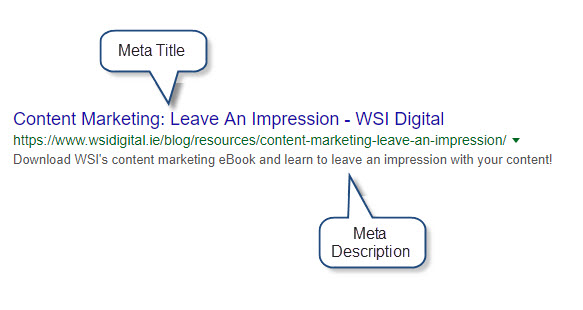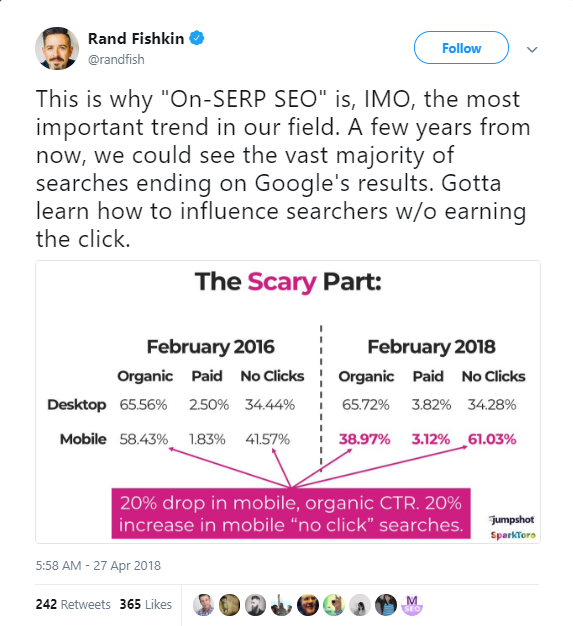One thing we can all agree on when it comes to digital is that “things change”!
At the end of last year we wrote a blog post around The Future of Marketing and introduced our 5 Predictions for 2019. One of our predictions was around the growth of On SERP SEO.

So what is On SERP SEO?
SERP is short for Search Engine Results Page – The page you see when you search for something in Google.
We are all familiar with the search process.
We type our query into the Google search box, look at the results that Google returns, and then pick the one that is most likely to address our question.
Clicking on the result, we expect to be directed to a website with information relating to our query.
However, a new experience has emerged where Google will include the answer right on the search results page – In this case, there is no real reason to visit the website at all.
Obviously this is a relatively new phenomenon and it only happens for a small percentage of searches but if you put this into context, it suddenly has the potential for a very significant impact on digital marketing.
When we wrote our predictions post we mentioned how surprised we were that more people aren’t talking about how big a deal this is, or alarmed by how fast actual clicks are declining.
We have all been trained that its a good thing to have your brand ranked high in the search results for a particular keyword and the goal is to lead the interested person right from the search results to your website.
It’s obviously still really important to have your brand ranked but how do we now make the connection to the searcher and influence their journey if they are not clicking through to our website?
Influencing Searchers Without Earning the Click…
Now that you have an overall understanding about what On SERP SEO means, lets define it a little further.
On-SERP SEO is the optimization of any and all content on SERPs that you can either control or influence in some way.
Traditionally, meta titles and meta descriptions were the only content that SEOs and content marketers could control on SERPs. We always advise our clients to treat this listing like an ad – people searching have a choice of options on the search results page so the goal is to make sure they are clicking on YOUR listing.

However Google has shaken up the search results page with the introduction of featured snippets.
In addition to the traditional listings illustrated in the above example, Google are now pulling information from your website and displaying the information right within the results page.
In many cases these organic search results (not paid for) are displayed in the most prominent position right on the top of the Search Results Page! Since these search results usually appear above the traditional search result listings this prominent display is often referred to as Position zero.
For example here is the featured snippet that appears on the SERP for the query, “How do you make pancakes?”:

For this particular result, the paragraph answer box is owned by allrecipes.com.
Start Googling things and, if you hadn’t already noticed, many SERPs will include a featured snippet at the top of the page, whether you are looking for the perfect pancake brunch recipe or maybe you needed an answer to a quick sports-related question – See example below where our specific question on the 1986 world cup prompted Google to provide a specific answer from wikipedia.

Rand Fishken, one of most influential SEO minds of the last decade, sums up the challenge perfectly when he says:
Gotta learn how to influence searchers without earning the click
Rand’s research shows a marked decrease over time in organic CTR, in other words a decrease in the number of searches that resulted in a website click and conversely a marked increase in the number of no click searches (Searches that were answered right on the search results page).
I’d like to share an entertaining video from Rand where he explores this topic in more detail and discusses the controversial idea that the future of Search Engine Optimisation campaigns may be focused right on the Search Results Page.
Why is On-SERP SEO Important?
There are a number of reasons why On-SERP SEO is important. On a basic level, we can use the pancake recipe example above to highlight why a business would covet the featured snippet that allrecipes.com currently has.
The snippet concisely explains how to make pancakes. Clear steps and ingredients are provided and of course, provides the link, should you need more info.
In the past, for a successful website like allrecipes.com, readership, traffic, and awareness were the bread & butter of their business. Now, however, websites like this may need to adjust their goals to accommodate the growing popularity of these On-SERP snippets.
As an agency, we are finding that this trend is not just restricted to Google. All of the major content platforms like LinkedIn, Twitter and Google are trying to keep users on their own sites so it is getting more and more difficult to earn organic traffic from the web’s biggest players. It is also worth noting that the volume of these “No click” searches will increase as digital voice assistants like Alexa and Google Home start become more commonplace.
Knowing that this is the trend, it makes sense to start tailoring your search engine strategy to maximise your brand’s potential influence in this new landscape.
As is usually the case in the digital world, the marketers and companies who figure out how to crack these tough questions are the big winners.
How to Optimize Your Content for SERPs
So now to answer the question you’re sitting there wondering to yourself: how do you optimize your content in order to attain a featured snippet on Google’s search engine results page?
Well here’s the short answer:
1. Do keyword research to develop a shortlist of specific questions that a) you can answer and b) you can rank for
2. Rank on the first page for one of these search query questions
3. Optimize the content of your web page to very specifically answer the question
The recommendation is to concentrate effort on branded terms as this is definitely a result you can control and as the brand owner, Google understands you are best positioned to own this result.
Ensure that your Digital Marketing agency or your in house team are monitoring the format of the search results for your shortlist of keywords so you can build structured snippets to support these results.
The lesson here is it’s never been more important to make your website (& email list) the centre of your campaigns.
Why?
The hard truth is that the web’s largest players continuously change the rules – We are seeing this now with Google but the same issue happened with Facebook where organic traffic dipped to all time lows and page followers became irrelevant – the only way to get eyeballs on your content is through paid advertising. There is always a cost to demand generation but longer term investments in digital should be in a platform where you control your customer’s journey.
At the end of the day, keeping up with On-SERP SEO trends, and perhaps attempting to win a featured snippet or two, likely puts you way ahead of your competition. And if you can become an expert at On-SERP SEO and make getting featured snippets like second nature, you’ll be reaping huge rewards in the future.


Stay Connected